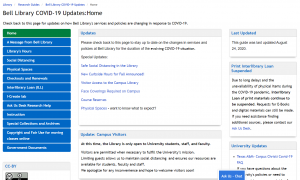Last Friday, the Dean of the Library, Cate Rudowsky, wrote a blog post discussing the upcoming Quality Enhancement Plan (QEP), information literacy, and why it’s all important. I’m going to dig a little bit deeper and talk about the actual concepts as they have been outlined in The Framework for Information Literacy in Higher Education, the go-to resource on everything you need to know about information literacy, which for the sake of my typin’ fingers, I’m just going to refer to it from now on as the Framework.
Basically, the Framework outlines the concepts that inform the way we ask questions, find information, evaluate information, and share or create information. There are six frames in the Framework and I want to put them into context so we all know what we’re talking about.
The six frames are:
- Authority is Constructed and Contextual
- Information Creation as a Process
- Information Has Value
- Research as Inquiry
- Scholarship as Conversation
- Searching as Strategic Exploration
There is a lot to unpack in each frame, so have decided to dedicate a blog post to each frame. This post will focus on Authority is Constructed and Contextual.
Start with the word “Authority.”
At the root of “Authority” is the word Author. So start there: who wrote the piece of information you’re reading? Why are they writing? What stake do they have in the information they’re presenting? What are their credentials (you can straight up google their name to learn more about them)? Who are they affiliated with? A public organization? A university? A company trying to make a profit? Check it out.
Now let’s talk about how authority is “Constructed.”
Have you ever heard the phrase “social construct”? Some people say gender is a social construct or language, written and spoken, is a construct. “Constructed” basically means humans made it up at some point to instill order in their communities. It’s not an observable, scientifically inevitable fact. When we say “authority” is constructed, we’re basically saying that we as individuals and as a society choose who we give authority to and sometimes we might not be choosing based on facts.
A common way of assessing authority is by looking at an author’s education. We’re inclined to trust someone with a PhD over someone with a high school diploma because we think they’re smarter. That’s a construct. We’re conditioned to think that someone with more education is smarter than a person with less education.
But there are a lot of reasons someone might not seek out higher education. They might have to work full-time, or take care of a family, or maybe they just never wanted to go to college. None of these factors impact someone’s intelligence or ability to think critically.

If aliens land on South Padre Island, there will be many voices contributing to the information collected about the event. Someone with a PhD in astrophysics might write an article about the mechanical workings of the aliens’ spaceship. Cool, they are an authority on that kind of stuff, so I trust them.
But the teenager who was on the island and watched the aliens land has first-hand experience of the event, so I trust them too. They have authority on the event even though they don’t have a PhD in astrophysics.
So we cannot think someone with more education is inherently more trustworthy, or smarter, or has more authority than anyone else. Some people who are authorities on a subject are highly educated, some are not.
Likewise, let’s say I film the aliens landing and live stream it on Facebook. At the same time, a police officer gives an interview on the news that says something contradicting my video evidence. Suddenly I have more authority than the police officer. Many of us are raised to trust certain people automatically based on their jobs, but that’s also a construct. The fun thing about critical thinking is that we can identify what is fact and fiction, and we can decide for ourselves who to trust.
The final word we have to pick out is “Contextual.”
This one is a little simpler. If I go to the hospital and a medical doctor takes out my appendix, I’m pretty happy with the outcome. If I go to the hospital and Dr. Rita Sperry, Associate Dean of University College, takes out my appendix, I’m probably a lot less happy.

Medical doctors have authority in the context of medicine. Dr. Sperry has authority in the context of education and computer science. And Dr. Dre has authority when it comes to music production and business.
This applies when we talk about experiential authority, too. If an 8th grade teacher tells me what it’s like to be a 4th grade teacher, I will not trust their authority. I will, however, trust a 4th grade teacher to tell me about teaching 4th grade.
The Takeaway:
Basically when we think about Authority, we need to ask ourselves, “Do I trust them? Why?” If they do not have experience with the subject (like witnessing an event or holding a job in the field) or subject expertise (education, research), then maybe they aren’t an authority.
P.S. Sorry for the uncalled for dig, Dr. Sperry. I’m sure you’d do your best with any appendectomy.
Emily Metcalf
Instructional Services Librarian


